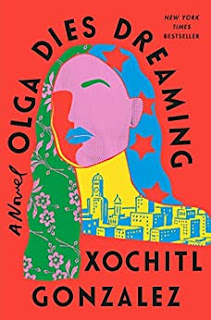The devastating hurricane in Puerto Rico a few years ago is central to the events and character development in the novel Olga Dies Dreaming by Xochitl Gonzalez. Prieto, one of the two central characters, is a congressman representing a district in Brooklyn. He reacts to the plight of the Puerto Ricans:
Olga Dies Dreaming (published in 2021) has many themes besides this, and I found a lot to like in the novel. I was impressed by the insights about the characters’ thoughts about material goods and especially the way that they view ultra-rich people and their values. The author has an original way to contrast wealth with poverty: contrasting those who have everything to people who want to avoid being poor and ethnically different. The author deeply understood how alienated and impoverished people wanted a place of their own: “Stomping up and down the stairs of a house your family owned, not getting policed by a landlord who wants your money but not the smells of your food or the sounds of your language.” (p. 25)“Unlike when Sandy took out power in New York, or when Houston was flooded after Harvey, or when fires burned the houses of Sonoma to the ground, these people had no one to go to. They had no real voice as far as the government was concerned. They paid taxes, served in U.S. wars, yet there was no one with actual power whose job was to fight for them. No one to represent them and demand action. On a good day, Prieto didn’t trust this administration not to fuck anyone who wasn’t a part of their ‘base.’ He could only imagine the cruel neglect they would subject upon an entire island of disenfranchised Brown and Black people. It was playing out before his very eyes. He wanted to stay to help, yes, but also so that no one could deny what he saw. No one could ‘spin’ it and say the footage was worse than the situation. He needed to bear witness.” (p. 264)
“Olga stared at Tía Lola intently as she seasoned beans, boiled rice, chopped onions, and sliced avocado. While she cooked, Lola hummed along to the Daddy Yankee song playing on the stereo system and from across the kitchen Olga attempted to discern something of her aunt beyond her boundless capacity to love. Her mother’s baby sister had always bucked convention. In college, she had studied accounting and, once done with school, landed a good job, chopped off all her hair, and took an apartment forty blocks north in Park Slope. Lola then proceeded to stack cheddar in a way that enabled her to care for her mother as she aged, keep Olga and Prieto in fresh back-to-school clothes, and still go on one cruise a year. On Saturdays, Lola, who had been the family chef since she herself was a girl, came and cooked for whatever family showed up. On Sundays, in good weather, she rode with her Puerto Rican motorcycle club. She never married. What she did with her days and nights outside of that, none of them knew. The block had long whispered that Lola was a lesbian, and Olga hadn’t ruled that out, but she also wasn’t completely convinced.” (p. 110)
The poem from which the author took the book’s title is “Puerto Rican Obituary,” and it’s worth reading at the Poetry Foundation website. The character in the book says of the poem: “That Olga was ashamed of her identity and died dreaming of money and being anything other than herself.” (p. 276) As the quote implies: this novel is about identity.
Review © 2022 mae sander


You are the second person in two days to recommend this book. Onto the TBR list it goes!
ReplyDeleteThis sounds like a great read. I often use the look up function of my e reader to translate words I don't know. Does the kindle have this?
ReplyDeleteThanks for the review. The book sounds interesting.
ReplyDeleteHello, Mae
ReplyDeleteAnother great review. Sounds like an interesting real life story. I will add this book to my reading list. Take care, enjoy your day!
Sounds like another very interesting book. I often wonder how the super-rich forget or plain do not know how the normal or poor person gets by.
ReplyDeleteThe ones who make living possible with their work...
It really was sad and unfair how Puerto Rico was treated after that hurricane and the lack of support they got from the government. And unfortunately, it doesn't just cover that one disaster. This sounds like a poignant story and I would like to know more about the character of Olga. I am adding this to my wish list.
ReplyDeleteSometimes a novel is an excellent way to get people to understand what others are going through.
ReplyDeleteAs you can see, you were an early recommender of this book for me. Thank you again for telling us about it and getting me to read it!
ReplyDelete